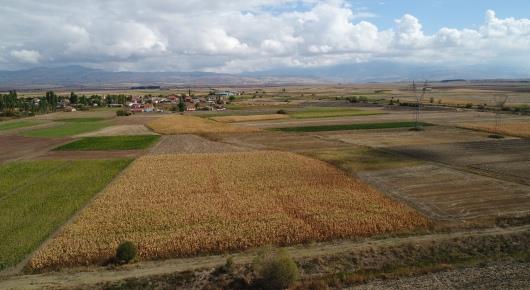FAO and the Republic of North Macedonia sign three-year cooperation agreement

11 July 2018, Skopje – Increased competitiveness of the agricultural sector, enhanced rural livelihood through sustainable rural development, and sustainable management of natural resources are the main priority areas of the three-year cooperation agreement inked today between FAO and the Republic of North Macedonia.
The 2018–2020 FAO Country Programming Framework was signed today in Skopje by the Macedonian Minister of Agriculture, Forestry and Water Economy, Ljupco Nikolovski, and Vladimir Rakhmanin, FAO Assistant Director-General and Regional Representative for Europe and Central Asia.
“Priorities highlighted in the agreement are closely aligned with the country’s own priorities in the National Strategy for Agriculture and Rural Development 2014–2020, aiming to support progressive alignment of the country’s agriculture and rural development with European Union accession requirements and the Sustainable Development Goals,” Rakhmanin said. “The agreement matches the country’s needs and priorities with the expertise and experience of FAO and contributes in particular to the sustainable and inclusive growth of smallholders and family farms, improved food safety and quality, sustainable and more resilient agriculture, and strong institutional capacity.”
Agriculture and food production play a vital role in the Macedonian economy, accounting for 16 percent of the gross domestic product and employing more than one-third of the national workforce. Due to the highly fragmented farm structure – each farm is smaller than 2 ha, on average – farms are low in productivity and competitiveness when compared to other countries in the region.
The framework document addresses constraints faced by rural communities, including limited investments in agricultural infrastructure, the ageing rural population, hampered access to markets for farmers, a lack of income-diversification opportunities, limited knowledge of sustainable practices, land degradation, and exposure to climate change. A soon-to-be-launched FAO project on integrated local community development will cover these areas.
Through the ongoing European Union-funded MAINLAND project, FAO is already helping smallholders and family farms overcome these difficulties while also aiding the ministry in developing a full-scale national land consolidation programme.
Plans also include upgrading standards for food safety, quality and marketing in the meat and dairy sectors; better integrating farmers into the food value chains, with a focus on the domestic broiler sub-sector; and helping reduce food loss and waste.
Support for government efforts to improve agricultural education and extension services is also part of the plan, along with designing and harmonizing agricultural and rural development policies in line with international and EU standards.
Another key priority of the programme is strengthening the country’s ability to manage natural resources sustainably – including water resources, forestry and fisheries – while also coping with climate change and reducing the risk of disaster in agriculture.
Preparing to tackle climate change
To support the country’s transition towards a more climate-resilient, sustainable agriculture and food system, FAO is helping the country access environmental climate finance from sources such as the Green Climate Fund and the Global Environment Facility.
Today, FAO’s Rakhmanin and Kocho Angjushev, the deputy prime minister of Economic Affairs, signed the first FAO-implemented project for the Republic of North Macedonia, funded by the Green Climate Fund’s Readiness and Preparatory Support Programme. With a value of USD 300 000, the project will assist the country in engaging with the Fund and in setting up mechanisms to establish national climate change adaptation and mitigation priorities.
The two partners also discussed today the possibility of developing a second GCF Readiness project, worth near USD 1 million, that would help country effectively access and deploy resources from the Green Climate Fund to finance the agriculture sector’s transition to a more sustainable and low-emission development path.
FAO has recently started cooperation with the Macedonian Ministry of Environment and Physical Planning on developing a regional project to help Balkan countries combat land degradation. That project is to be financed by the Global Environment Facility.
“We look forward to enhancing cooperation with the Government and Macedonian people,” Rakhmanin said, “to help the country meet Sustainable Development Goals as well as requirements for EU integration.”
11 July 2018, Skopje, the Republic of North Macedonia
